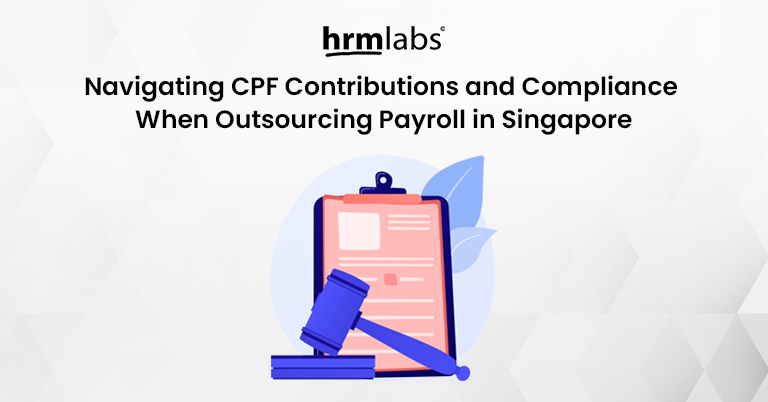Outsourcing payroll in Singapore can bring many benefits to businesses, including cost savings, increased efficiency, and reduced risk of errors. However, it also comes with new challenges, particularly in the area of compliance. One of the most important compliance requirements for businesses in Singapore is the Central Provident Fund (CPF) contribution.
In this article, we’ll explore how businesses can navigate CPF contributions and compliance when outsourcing payroll in Singapore.
Introduction
Outsourcing payroll in Singapore has become increasingly popular in recent years, as businesses seek to focus on their core competencies and reduce administrative burdens. However, outsourcing payroll also comes with new challenges, particularly in the area of compliance. One of the most important compliance requirements for businesses in Singapore is the Central Provident Fund (CPF) contribution. The CPF is a mandatory social security savings scheme for employees in Singapore, and employers are required to make contributions on behalf of their employees. In this article, we’ll explore how businesses can navigate CPF contributions and compliance when outsourcing payroll in Singapore.
Understanding CPF Contributions

The CPF is a mandatory social security savings scheme for employees in Singapore, which provides retirement, healthcare, and housing benefits. Employers are required to make CPF contributions on behalf of their employees, based on their age and monthly salary. The current CPF contribution rates for employers in Singapore are as follows:
- 17% for employees aged below 55 years old
- 13% for employees aged 55 to 60 years old
- 9% for employees aged 60 to 65 years old
- 7.5% for employees aged 65 years old and above
These rates are subject to a cap of $6,000 per month.
When outsourcing payroll in Singapore, it’s important to ensure that the payroll service provider is making CPF contributions on behalf of employees, and that the contributions are accurate and timely. Employers are ultimately responsible for ensuring that CPF contributions are made on behalf of their employees, even if they have outsourced payroll processing to a third-party provider.
Navigating Compliance When Outsourcing Payroll
In addition to CPF contributions, businesses in Singapore must also comply with other regulations and requirements when outsourcing payroll. These include the Inland Revenue Authority of Singapore (IRAS) and the yearly submission of the IR8A form. The IRAS is the tax authority in Singapore, and businesses must ensure that they are compliant with tax regulations and requirements. The IR8A form is a yearly tax form that employers must submit to the IRAS, which reports the income earned by employees and the tax withheld.
To navigate compliance when outsourcing payroll, businesses should ensure that their payroll service provider is experienced and knowledgeable in Singapore’s tax and payroll regulations. They should also ensure that their payroll service provider has robust internal processes and controls in place to ensure compliance with regulations and requirements.
Utilizing PSG Grants for Outsourcing Payroll
The Singapore government has introduced the Productivity Solutions Grant (PSG) to help businesses adopt technology solutions and increase productivity. The PSG can be used to offset up to 80% of the cost of outsourcing payroll services. To qualify for the PSG, businesses must meet the eligibility criteria, which include being registered and operating in Singapore, and having a minimum of 30% local shareholding.
By utilizing the PSG, businesses can reduce the cost of outsourcing payroll services, while also increasing productivity and efficiency.
Navigating CPF contributions and compliance when outsourcing payroll in Singapore can be a challenging task, but it’s an essential one to get right. Partnering with a trusted payroll outsourcing provider that has expertise in CPF regulations and compliance can help businesses avoid costly mistakes and ensure that they are meeting their legal obligations.
With the implementation of PSG and the changes to IRAS and IR8A reporting requirements, outsourcing payroll can help businesses in Singapore navigate these changes with ease. Additionally, outsourcing can free up valuable time and resources for businesses to focus on their core competencies and strategic objectives.

To ensure a successful partnership, businesses should choose a payroll outsourcing provider with a proven track record, experience in the Singapore market, and a deep understanding of CPF regulations and compliance. By doing so, businesses can enjoy the benefits of streamlined payroll processing, increased accuracy, and reduced risk of non-compliance, enabling them to focus on their growth and success.
Get reliable payroll outsourcing in Singapore by the most powerful HRM system HRMLabs. Our team of experts will help you to navigate Singapore’s ever-changing payroll compliance regulations. Ensure your payroll always compliance with Singapore Payroll and Employment Laws & Rules.



